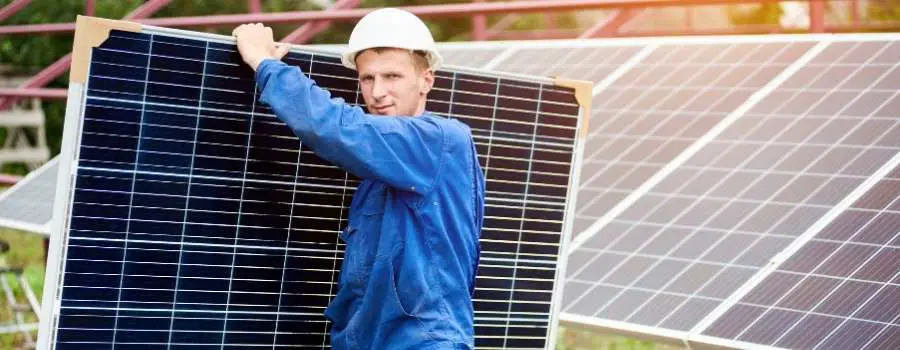
Solar power seems to be, by all accounts, the future. It has to be, as only renewable energy sources will actually last forever – our supplies of coal, oil, gas, and other naturally occurring fossil fuels will not be naturally occurring for very much longer.
In fact, research seems to imply that by 2060, all of our natural fossil fuels, including coal and gasses, are likely to be entirely depleted. This date is actually a very conservative estimate and does not account for the exponentially climbing rate of fossil fuel usage.
Since the sun is not going away by 2060, it has approximately ten billion years of life left before it explodes and goes supernova. It is also a huge glowing ball of pure energy, and the majority of life on this planet is sustained by the power it provides through pure sunlight.
Here are 7 ways solar energy is beneficial to the environment:
- Reduction of Carbon Footprint
- Less Pollution
- Cuts Down Transport Costs and Inefficiencies When Moving Energy to Other Areas
- Takes Weight Off Traditional Power Sources During Peak Hours
- Less Environmental Impact From Upkeep and Maintenance
- Less Risk of Energy Accidents
- A Renewable Source of Energy
1. Reduction of Carbon Footprint
The most obvious, and arguably most important point, is this one. By using solar power more, and replacing more traditional fossil fuel with this source of energy, we can begin to reduce our global carbon footprint. The aim here is to reduce the production of extra carbon dioxide and monoxide, which are having a terrible effect on our environment and ozone layer.
These carbon-based gases are known as “greenhouse gases” for a reason…what they do to our ozone layer is to create a layer that effectively traps heat inside it, raising the planet’s internal temperature. This effect is known as global warming, a phrase we’re becoming more and more familiar with as the planet is hotting up.
By substituting solar power where we can, we can reduce this carbon footprint by a significant amount! The problem with encouraging businesses and families to switch to solar is that the power output from these sources are much smaller than traditional fossil fuel sources.
However, there are ways in which we can supplement traditional power sources with solar during certain times of the year (like the summer and spring seasons) by only using traditional fuels in hours and times of the year we cannot effectively use solar power.
For example, on a hot summer day, there is not any reason that the energy cannot be stored throughout the bright morning and afternoons and then used later on to power a domicile during the evening hours.
2. Less Pollution
Solar power also generates much less ambient waste than fossil fuels and other renewable resources!
While nuclear energy is technically a renewable source of power, a lot of the materials powering that source is not. Moreover, a lot of these fuel sources generate a huge amount of waste – some of which cannot be disposed of!
With nuclear power, the nuclear waste material is so toxic and so deadly, it needs to be sealed in concrete and buried deep within the earth. Tons and tons of nuclear waste being buried deep within the ground cannot possibly be good for the planet!
There have been numerous stories of nuclear power companies treating the environment poorly, dumping waste into rivers, and the like. With solar power, there is no chance of this happening, as there are no waste products that could count as pollutants.
Coal power stations also leave waste products that have slightly radioactive elements to them. On top of that, these kinds of power stations also produce boiler slag and other pollutants that can get into and damage the surrounding environment.
Again, this is one of the particular benefits of solar power. Despite an expensive initial cost, this form of energy produces next to no excess waste, converting sunlight into energy in a very efficient manner.
3. Cuts Down Transport Costs and Inefficiencies When Moving Energy to Other Areas
This is another benefit of solar power if it gets implemented on a household to household basis. The problem with the usage of huge power stations that coal, gas, and nuclear fuels normally rely upon is that the transportation of this energy all around an area or country is both incredibly expensive and wasteful on a structural level.
There is a huge differential in the amount of energy actually generated, and the amount that gets effectively distributed to the different users of that bulk source.
Along the different power lines and methods of transferring, a lot of the electricity generated from these methods is lost, meaning more than necessary has to be generated in the first place in order to make up for that loss.
In order to stop excess fossil fuels from being burned, household-based solar power solutions could cut down a large amount of unnecessary damage to the environment. These smaller-scale solutions to energy problems would work really well, as they can better address energy requirements on a specific needs basis, ideal for curbing the production of extra fossil fuels.
4. Takes Weight Off Traditional Power Sources During Peak Hours
Another problem with these traditional sources of power is that so many people relying on them at the same time of the day. Peak times for power usage tends to be from 11 am to 4 pm in the afternoon/early evening. Coincidentally, these are also the peak times for sunshine!

These energy sources that do more damage to the natural world are heavily taxed during peak hours, leading to a huge amount of pollutants and greenhouse gases being produced during the day.
This can be avoided by the smart implementation of proper solar power! At these peak times, when the sunlight is the most intense, solar panels and other solar power generators can be used to great effect, taking the weight of some of the energy production during these difficult and taxing times.
Even if solar power cannot properly manage all of the processes during that time, it can at least act as a limiting force on the damage already being done to our environment during peak times by heavily polluting power sources like coal, oil, gas, or nuclear power stations.
5. Less Environmental Impact From Upkeep and Maintenance
Another hidden environmental impact of different fuel and power sources is the cost for upkeep and maintenance. There are several costs of this kind associated with the upkeep of fossil fuel source power plants and even some renewable plants.
For example, a nuclear station must be constantly cooled in order to stop the reactor from overheating…an essential part of the process if you want to avoid a huge meltdown!
In order to meet environmental regulations, coal power stations need a really large staff under constant employment to monitor and control, which is both resource and cost-effective. This staff all use energy, and the general maintenance is itself fuel-intensive.
All in all, the amount of control and maintenance required to keep these plants safe and in regulation adds up to a lot of waste that is not beneficial for the environment.
Standing as an attractive alternative here, solar power is a much less resource-intensive and lower maintenance form of energy generation. If there are faults, you will need a qualified electrician to come and sort it out for you, but these faults are generally much rarer than any in coal or nuclear power stations.
It also does not need the same type of general staffing – even large scale solar farms have much fewer environmental and financial expenditures when compared to nuclear or coal plants of a similar scale.
6. Less Risk of an Energy Accident
The maintenance mentioned above is essential in keeping a lot of things in check with nuclear, coal, and gas power stations. One of the most important things to keep in check is the risk of an energy accident. This type of accident is what happens when a power plant has a meltdown.
Now, the most infamous of these is undoubtedly the 1986 Chernobyl meltdown in Pripyat, Russia. It is not, however, uncommon for coal, oil, or gas power plants to also have meltdowns.
Meltdowns on this scale have horrific personal and environmental consequences, the fallout from Chernobyl made the surrounding area in Pripyat uninhabitable for a long time, morphing and mutating flora and fauna for years afterward.
Another famous example of an energy accident comes from much more recent times. In 2010, an oil rig off the Gulf of Mexico called Deepwater Horizon experienced a massive calamity after a fire broke out and a huge explosion rocked the decks of the rig. This rig, a scant 50 miles from the coast, had approximately 205,000,000 Gallons of crude oil at risk if a spill broke out.
And break out it did!
All told, there were approximately 168 million gallons of crude oil spilled straight into the ocean that day. The slick substance got on animals, plant life, and contaminated the surrounding environment for years and years to come.
Whenever energy is harnessed, pollution, environmental collapse, and disaster seem to follow fairly close behind.
This does not have to be the case.
Certain renewable resources, when harnessed correctly, can provide large amounts of energy without the risk of environmental calamity when not properly monitored.
With solar energy, there is no risk of fuel leaking into the natural world and damaging huge swathes of it in go, there is no risk of a calamitous reactor meltdown that makes a whole section of a country nigh on uninhabitable for decades. Instead, solar power relies only on power provided it to it by the rays of the sun!
This form of energy production entirely eliminates any possibility of harmful fuel source producing highly dangerous environmental consequences.
7. A Renewable Source of Energy
Last but not least, we have the fact that solar power is a renewable resource. Although this has been partially covered in our introduction, its importance cannot be overstated. Fossil fuel energy is highly dangerous, inefficient, and potentially wasteful, and they are also a highly limited resource.
At our current rates of consumption, we would be incredibly lucky if our dwindling fossil fuel resources last for another forty years. As we have already discussed, the sun is absolutely not going to run out in that time. This is not the only problem with these fuels being a limited resource, however.
If we want to avoid the further depletion and contamination of our natural resources, it only makes sense to start to shift towards Solar Power, which provides these 7 ways (and many more besides) to benefit the environment.
